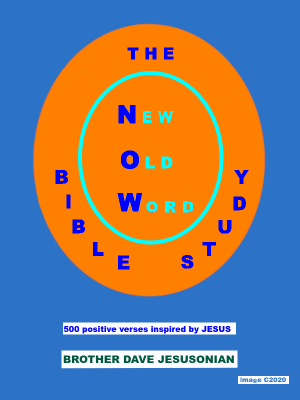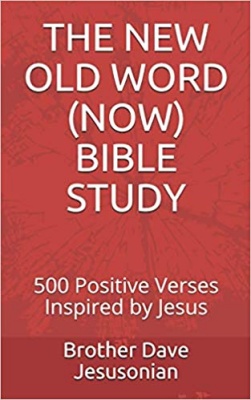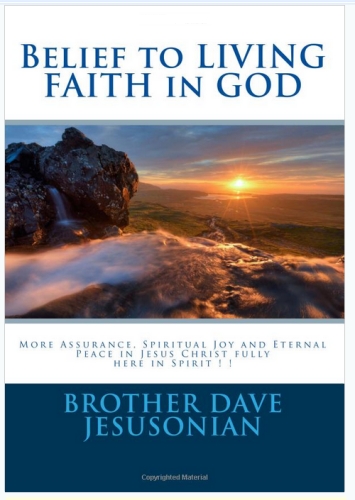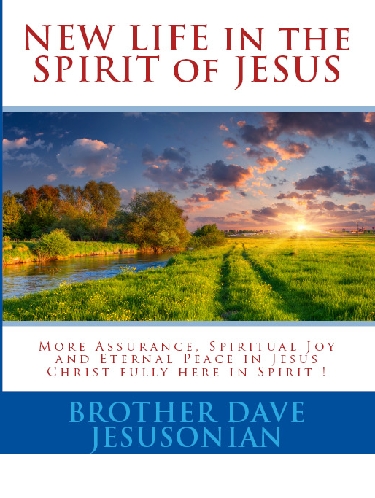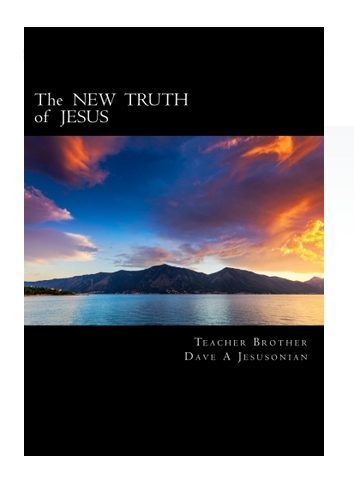|
TOPICAL STUDIES from
THE NEW EPOCHAL REVELATION OF TRUTH.
NOW UPDATED TOPICAL STUDIES INDEX Check these out:
"TRUTH and TRUTHS" -all, plus "GOD within you !"
Part 76
PAPER 161 FURTHER DISCUSSIONS WITH RODAN, Cont. 2. THE DIVINE NATURE OF JESUS [Paper:Section.Paragraph (numbers)] 161:2.1 Since Nathaniel and Thomas had so fully approved Rodan's views of the gospel of the kingdom, there remained only one more point to consider, the teaching dealing with the divine nature of Jesus, a doctrine only so recently publicly announced. Nathaniel and Thomas jointly presented their views of the divine nature of the Master, and the following narrative is a condensed, rearranged, and restated presentation of their teaching: 161:2.2 #1. Jesus has admitted his divinity, and we believe him Many remarkable things have happened in connection with his ministry which we can understand only by believing that he is the Son of God as well as the Son of Man. 161:2.3 #2. His life association with us exemplifies the ideal of human friendship; only a divine being could possibly be such a human friend. He is the most truly unselfish person we have ever known. He is the friend even of sinners; he dares to love his enemies. He is very loyal to us. While he does not hesitate to reprove us, it is plain to all that he truly loves us. The better you know him, the more you will love him. You will be charmed by his unswerving devotion. Through all these years of our failure to comprehend his mission, he has been a faithful friend. While he makes no use of flattery, he does treat us all with equal kindness; he is invariably tender and compassionate. He has shared his life and everything else with us. We are a happy community; we share all things in common. We do not believe that a mere human could live such a blameless life under such trying circumstances. 161:2.4 #3. We think Jesus is divine because he never does wrong; he makes no mistakes. His wisdom is extraordinary; his piety superb. He lives day by day in perfect accord with the Father's will. He never repents of misdeeds because he transgresses none of the Father's laws. He prays for us and with us, but he never asks us to pray for him. We believe that he is consistently sinless. We do not think that one who is only human ever professed to live such a life. He claims to live a perfect life, and we acknowledge that he does. Our piety springs from repentance, but his piety springs from righteousness. He even professes to forgive sins and does heal diseases. No mere man would sanely profess to forgive sin; that is a divine prerogative. And he has seemed to be thus perfect in his righteousness from the times of our first contact with him. We grow in grace and in the knowledge of the truth, but our Master exhibits maturity of righteousness to start with. All men, good and evil, recognize these elements of goodness in Jesus. And yet never is his piety obtrusive or ostentatious. He is both meek and fearless. He seems to approve of our belief in his divinity. He is either what he professes to be, or else he is the greatest hypocrite and fraud the world has ever known. We are persuaded that he is just what he claims to be. [Absolutely ! Amen !] 161:2.5 #4. The uniqueness of his character and the perfection of his emotional control convince us that he is a combination of humanity and divinity. He unfailingly responds to the spectacle of human need; suffering never fails to appeal to him. His compassion is moved alike by physical suffering, mental anguish, or spiritual sorrow. He is quick to recognize and generous to acknowledge the presence of faith or any other grace in his fellow men. He is so just and fair and at the same time so merciful and considerate. He grieves over the spiritual obstinacy of the people and rejoices when they consent to see the light of truth. 161:2.6 #5. He seems to know the thoughts of men's minds and to understand the longings of their hearts. And he is always sympathetic with our troubled spirits. He seems to possess all our human emotions, but they are magnificently glorified. He strongly loves goodness and equally hates sin. He possesses a superhuman consciousness of the presence of Deity. He prays like a man but performs like a God. He seems to foreknow things; he even now dares to speak about his death, some mystic reference to his future glorification. While he is kind, he is also brave and courageous. He never falters in doing his duty. 161:2.7 #6. We are constantly impressed by the phenomenon of his superhuman knowledge. Hardly does a day pass but something transpires to disclose that the Master knows what is going on away from his immediate presence. He also seems to know about the thoughts of his associates. He undoubtedly has communion with celestial personalities; he unquestionably lives on a spiritual plane far above the rest of us. Everything seems to be open to his unique understanding. He asks us questions to draw us out, not to gain information. 161:2.8 #7. Recently the Master does not hesitate to assert his superhumanity From the day of our ordination as apostles right on down to recent times, he has never denied that he came from the Father above. He speaks with the authority of a divine teacher. The Master does not hesitate to refute the religious teachings of today and to declare the new gospel with positive authority. He is assertive, positive, and authoritative. Even John the Baptist, when he heard Jesus speak, declared that he was the Son of God. He seems to be so sufficient within himself. He craves not the support of the multitude; he is indifferent to the opinions of men. He is brave and yet so free from pride. 161:2.9 #8. He constantly talks about God as an ever-present associate in all that he does. He goes about doing good, for God seems to be in him. He makes the most astounding assertions about himself and his mission on earth, statements which would be absurd if he were not divine. He once declared, "Before Abraham was I am." He has definitely claimed divinity; he professes to be in partnership with God. He well-nigh exhausts the possibilities of language in the reiteration of his claims of intimate association with the heavenly Father. He even dares to assert that he and the Father are one. He says that any one who has seen him has seen the Father. And he says and does all these tremendous things with such childlike naturalness. He alludes to his association with the Father in the same manner that he refers to his association with us. He seems to be so sure about God and speaks of these relations in such a matter-of-fact way. [Today, He enters the human soul and mind to elevate and transform all believers in Him Jesus and in all Truth-lovers ! I am blessed know by direct spiritual Vision the Oneness of God and Jesus -- both above and within ... Jesus Christ IS I AM here with us ! Jesus is the fullness of God the Paradise Universal Father to us and to all beings in His/our large local Universe of Nebadon with ten million human-inhabited planets at the end of this first Grand Universe Supreme Age ! Jesus Christ is, and will be, our Creator Father and Very Elder Brother Guiding us eternally !!] 161:2.10 #9. In his prayer life he appears to communicate directly with his Father. We have heard few of his prayers, but these few would indicate that he talks with God, as it were, face to face. He seems to know the future as well as the past. He simply could not be all of this and do all of these extraordinary things unless he were something more than human. We know he is human, we are sure of that, but we are almost equally sure that he is also divine. We believe that he is divine. We are convinced that he is the Son of Man and the Son of God. [Yes, our loving and merciful Creator Father, Eternal Son of God, and also our very Elder Brother as Son of Man ! What a glorious spiritual Destiny we have with and within Him !] 161:2.11 When Nathaniel and Thomas had concluded their conferences with Rodan, they hurried on toward Jerusalem to join their fellow apostles, arriving on Friday of that week. This had been a great experience in the lives of all three of these believers, and the other apostles learned much from the recounting of these experiences by Nathaniel and Thomas. 161:2.12 Rodan made his way back to Alexandria, where he long taught his philosophy in the school of Meganta. He became a mighty man in the later affairs of the kingdom of heaven; he was a faithful believer to the end of his earth days, yielding up his life in Greece with others when the persecutions were at their height. 3. Jesus’ Human and Divine Minds 161:3.1 Consciousness of divinity was a gradual growth in the mind of Jesus up to the occasion of his baptism. After he became fully self-conscious of his divine nature, prehuman existence, and universe prerogatives, he seems to have possessed the power of variously limiting his human consciousness of his divinity. It appears to us that from his baptism until the crucifixion it was entirely optional with Jesus whether to depend only on the human mind or to utilize the knowledge of both the human and the divine minds. At times he appeared to avail himself of only that information which was resident in the human intellect. On other occasions he appeared to act with such fullness of knowledge and wisdom as could be afforded only by the utilization of the superhuman content of his divine consciousness. 161:3.2 We can understand his unique performances only by accepting the theory that he could, at will, self-limit his divinity consciousness. We are fully cognizant that he frequently withheld from his associates his foreknowledge of events, and that he was aware of the nature of their thinking and planning. We understand that he did not wish his followers to know too fully that he was able to discern their thoughts and to penetrate their plans. He did not desire too far to transcend the concept of the human as it was held in-the minds of his apostles and disciples. 161:3.3 We are utterly at a loss to differentiate between his practice of self-limiting his divine consciousness and his technique of concealing his preknowledge and thought discernment from his human associates. We are convinced that he used both of these techniques, but we are not always able, in a given instance, to specify which method he may have employed. We frequently observed him acting with only the human content of consciousness; then would we behold him in conference with the directors of the celestial hosts of the universe and discern the undoubted functioning of the divine mind. And then on almost numberless occasions did we witness the working of this combined personality of man and God as it was activated by the apparent perfect union of the human and the divine minds. This is the limit of our knowledge of such phenomena; we really do not actually know the full truth about this mystery. ["We" are the twelve Midwayers here under the supervision of a Melchizedek revelatory director. Fully understanding the Divine Incarnation of God in and as Jesus our God-Man Creator Father-Son-Spirit will long remain a mystery to us.] PAPER 162 AT THE FEAST OF TABERNACLES 0. Introduction 162:0.1 When Jesus started up to Jerusalem with the ten apostles, [around late September of A.D. 29] he planned to go through Samaria, that being the shorter route. Accordingly, they passed down the eastern shore of the lake and, by way of Scythopolis, entered the borders of Samaria. Near nightfall Jesus sent Philip and Matthew over to a village on the eastern slopes of Mount Gilboa to secure lodging for the company. It so happened that these villagers were greatly prejudiced against the Jews, even more so than the average Samaritans, and these feelings were heightened at this particular time as so many were on their way to the feast of tabernacles. These people knew very little about Jesus, and they refused him lodging because he and his associates were Jews. When Matthew and Philip manifested indignation and informed these Samaritans that they were declining to entertain the Holy One of Israel, the infuriated villagers chased them out of the little town with sticks and stones. 162:0.2 After Philip and Matthew had returned to their fellows and reported how they had been driven out of the village, James and John stepped up to Jesus and said: "Master, we pray you to give us permission to bid fire come down from heaven to devour these insolent and impenitent Samaritans." But when Jesus heard these words of vengeance, he turned upon the sons of Zebedee and severely rebuked them: "You know not what manner of attitude you manifest. Vengeance savors not of the outlook of the kingdom of heaven. Rather than dispute, let us journey over to the little village by the Jordan ford." Thus because of sectarian prejudice these Samaritans denied themselves the honor of showing hospitality to the Creator Son of a universe. [our True God-man Jesus is our Creator. See John 1:1-18 and Heb 1:1-3 God never did any "wrath" or "vengeance" as falsely stated by many human authors of the Old Testament ! God is just as loving and kind as Jesus is ! They are One in Spirit ! ] ... 2. THE FIRST TEMPLE TALK 162:2.1 The first afternoon that Jesus taught in the temple, a considerable company sat listening to his words depicting the liberty of the new gospel and the joy of those who believe the good news, when a curious listener interrupted him to ask: "Teacher, how is it you can quote the Scriptures and teach the people so fluently when I am told that you are untaught in the learning of the rabbis?" Jesus replied: "No man has taught me the truths which I declare to you. And this teaching is not mine but His who sent me. If any man really desires to do my Father's will, he shall certainly know about my teaching, whether it be God's or whether I speak for myself. He who speaks for himself seeks his own glory, but when I declare the words of the Father, I thereby seek the glory of him who sent me. But before you try to enter into the new light, should you not rather follow the light you already have? Moses gave you the law, yet how many of you honestly seek to fulfill its demands? Moses in this law enjoins you, saying, 'You shall not kill'; notwithstanding this command some of you seek to kill the Son of Man." [!!] 162:2.2 When the crowd heard these words, they fell to wrangling among themselves. Some said he was mad; some that he had a devil. Others said this was indeed the prophet of Galilee whom the scribes and Pharisees had long sought to kill. Some said the religious authorities were afraid to molest him; others thought that they laid not hands upon him because they had become believers in him. After considerable debate one of the crowd stepped forward and asked Jesus, "Why do the rulers seek to kill you?" And he replied: "The rulers seek to kill me because they resent my teaching about the good news of the kingdom, a gospel that sets men free from the burdensome traditions of a formal religion of ceremonies which these teachers are determined to uphold at any cost. They circumcise in accordance with the law on the Sabbath day, but they would kill me because I once on the Sabbath day set free a man held in the bondage of affliction. They follow after me on the Sabbath to spy on me but would kill me because on another occasion I chose to make a grievously stricken man completely whole on the Sabbath day. They seek to kill me because they well know that, if you honestly believe and dare to accept my teaching, their system of traditional religion will be overthrown, forever destroyed. Thus will they be deprived of authority over that to which they have devoted their lives since they steadfastly refuse to accept this new and more glorious gospel of the kingdom of God. And now do I appeal to every one of you: Judge not according to outward appearances but rather judge by the true spirit of these teachings; judge righteously." [even today, many churches have oppressive ecclesiastical authority, selfish properties and stores of gold -- and all tax-free ! That will come down as personal God-consciousness increases.] 162:2.3 Then said another inquirer: "Yes, Teacher, we do look for the Messiah, but when he comes, we know that his appearance will be in mystery. We know whence you are. You have been among your brethren from the beginning. The deliverer will come in power to restore the throne of David's kingdom. [Never !] Do you really claim to be the Messiah?" And Jesus replied: "You claim to know me and to know whence I am. I wish your claims were true, for indeed then would you find abundant life in that knowledge. But I declare that I have not come to you for myself; I have been sent by the Father, and he who sent me is true and faithful. By refusing to hear me, you are refusing to receive him who sends me. You, if you will receive this gospel, shall come to know him who sent me. I know the Father, for I have come from the Father to declare and reveal him to you." 162:2.4 The agents of the scribes wanted to lay hands upon him, but they feared the multitude, for many believed in him. Jesus' work since his baptism had become well known to all Jewry, and as many of these people recounted these things, they said among themselves: "Even though this teacher is from Galilee, and even though he does not meet all of our expectations of the Messiah, we wonder if the deliverer, when he does come, will really do anything more wonderful than this Jesus of Nazareth has already done." [infinitely less than our universe Sovereign Creator Son of God Jesus Christ Michael !!] 162:2.5 When the Pharisees and their agents heard the people talking this way, they took counsel with their leaders and decided that something should be done forthwith to put a stop to these public appearances of Jesus in the temple courts. The leaders of the Jews, in general, were disposed to avoid a clash with Jesus, believing that the Roman authorities had promised him immunity. They could not otherwise account for his boldness in coming at this time to Jerusalem; but the officers of the Sanhedrin did not wholly believe this rumor. They reasoned that the Roman rulers would not do such a thing secretly and without the knowledge of the highest governing body of the Jewish nation. 162:2.6 Accordingly, Eber, the proper officer of the Sanhedrin, with two assistants was dispatched to arrest Jesus. As Eber made his way toward Jesus, the Master said: "Fear not to approach me. Draw near while you listen to my teaching. I know you have been sent to apprehend me, but you should understand that nothing will befall the Son of Man until his hour comes. You are not arrayed against me; you come only to do the bidding of your masters, and even these rulers of the Jews verily think they are doing God's service when they secretly seek my destruction. 162:2.7 "I bear none of you ill will. The Father loves you, and therefore do I long for your deliverance from the bondage of prejudice and the darkness of tradition. I offer you the liberty of life and the joy of salvation. I proclaim the new and living way, the deliverance from evil and the breaking of the bondage of sin. I have come that you might have life, and have it eternally. You seek to be rid of me and my disquieting teachings. If you could only realize that I am to be with you only a little while ! In just a short time I go to him who sent me into this world. And then will many of you diligently seek me, but you shall not discover my presence, [with physical eyes] for where I am about to go you cannot come. But all who truly seek to find me shall sometime attain the life that leads to my Father's presence." 162:2.8 Some of the scoffers said among themselves: "Where will this man go that we cannot find him? Will he go to live among the Greeks? Will he destroy himself? What can he mean when he declares that soon he will depart from us, and that we cannot go where he goes?" 162:2.9 Eber and his assistants refused to arrest Jesus; they returned to their meeting place without him. When, therefore, the chief priests and the Pharisees upbraided Eber and his assistants because they had not brought Jesus with them, Eber only replied: "We feared to arrest him in the midst of the multitude because many believe in him. Besides, we never heard a man speak like this man. There is something out of the ordinary about this teacher. You would all do well to go over to hear him." And when the chief rulers heard these words, they were astonished and spoke tauntingly to Eber: "Are you also led astray? Are you about to believe in this deceiver? Have you heard that any of our learned men or any of the rulers have believed in him? Have any of the scribes or the Pharisees been deceived by his clever teachings? How does it come that you are influenced by the behavior of this ignorant multitude who know not the law or the prophets? Do you not know that such untaught people are accursed?" And then answered Eber: "Even so, my masters, but this man speaks to the multitude words of mercy and hope. He cheers the downhearted, and his words were comforting even to our souls. What can there be wrong in these teachings even though he may not be the Messiah of the Scriptures? And even then does not our law require fairness? Do we condemn a man before we hear him?" And the chief of the Sanhedrin was wroth with Eber and, turning upon him, said: "Have you gone mad? Are you by any chance also from Galilee? Search the Scriptures, and you will discover that out of Galilee arises no prophet, much less the Messiah." 162:2.10 The Sanhedrin disbanded in confusion, and Jesus withdrew to Bethany for the night. ... 5. SERMON ON THE LIGHT OF THE WORLD 162:5.1 On the evening of the next to the last day of the feast, when the scene was brilliantly illuminated by the lights of the candelabras and the torches, Jesus stood up in the midst of the assembled throng and said: 162:5.2 "I am the light of the world. He who follows me shall not walk in darkness but shall have the light of life. Presuming to place me on trial and assuming to sit as my judges, you declare that, if I bear witness of myself, my witness cannot be true. But never can the creature sit in judgment on the Creator. Even if I do bear witness about myself, my witness is everlastingly true, for I know whence I came. who I am. and whither I go. You who would kill the Son of Man know not whence I came, who I am, or whither I go. You judge only by the appearances of the flesh; you do not perceive the realities of the spirit. I judge no man, not even my archenemy. But if I should choose to judge, my judgment would be true and righteous, for I would judge not alone but in association with my Father, who sent me into the world, and who is the source of all true judgment. You even allow that the witness of two reliable persons may be accepted -- well, then, I bear witness of these truths; so also does my Father in heaven. And when I told you this yesterday, in your darkness you asked me, 'Where is your Father?' Truly, you know neither me nor my Father, for if you had known me, you would also have known the Father. [God and Jesus are eternally and absolutely One in Spirit ! Those having perfect faith, a Gift from God, know that when they see and worship Jesus they are seeing and worshiping God the Universal Father !!] 162:5.3 "I have already told you that I am going away, and that you will seek me and not find me, for where I am going you cannot come. You who would reject this light are from beneath; I am from above. You who prefer to sit in darkness are of this world; I am not of this world, and I live in the eternal light of the Father of lights. You all have had abundant opportunity to learn who I am, but you shall have still other evidence confirming the identity of the Son of Man. I am the light of life, and every one who deliberately and with understanding rejects this saving light shall die in his sins. Much I have to tell you, but you are unable to receive my words. However, he who sent me is true and faithful; my Father loves even his erring children. And all that my Father has spoken I also proclaim to the world. 162:5.4 "When the Son of Man is lifted up, then shall you all know that I am he, and that I have done nothing of myself but only as the Father has taught me. I speak these words to you and to your children. [Jesus is still here in Spirit; and He continues to teach us and to lead and guide us into all Truth !] And he who sent me is even now with me; he has not left me alone, for I do always that which is pleasing in his sight." 162:5.5 As Jesus thus taught the pilgrims in the temple courts, many believed. And no man dared to lay hands upon him. 6. DISCOURSE ON THE WATER OF LIFE 162:6.1 On the last day, the great day of the feast, as the procession from the pool of Siloam passed through the temple courts, and just after the water and the wine had been poured down upon the altar by the priests, Jesus, standing among the pilgrims, said: "If any man thirst, let him come to me and drink. From the Father above I bring to this world the water of life. He who believes me shall be filled with the spirit which this water represents, for even the Scriptures have said, 'Out of him shall flow rivers of living waters.' When the Son of Man has finished his work on earth, there shall be poured out upon all flesh the living Spirit of Truth. Those who receive this spirit shall never know spiritual thirst." 162:6.2 Jesus did not interrupt the service to speak these words. He addressed the worshipers immediately after the chanting of the Hallel, the responsive reading of the Psalms accompanied by waving of the branches before the altar. Just here was a pause while the sacrifices were being prepared, and it was at this time that the pilgrims heard the fascinating voice of the Master declare that he was the giver of living water to every spirit-thirsting soul. [Today, He the Spirit of Truth -- Jesus and the Father as One Holy Father-Son-Spirit of all Truth -- is flooding down Light and Life and Truth to us ! May we be ever more receptive to His Eternal Presence and Divine Teachings !] 162:6.3 At the conclusion of this early morning service Jesus continued to teach the multitude, saying: "Have you not read in the Scripture: 'Behold, as the waters are poured out upon the dry ground and spread over the parched soil, so will I give the spirit of holiness to be poured out upon your children for a blessing even to your children's children'? Why will you thirst for the ministry of the spirit while you seek to water your souls with the traditions of men, poured from the broken pitchers of ceremonial service? That which you see going on about this temple is the way in which your fathers sought to symbolize the bestowal of the divine spirit upon the children of faith, and you have done well to perpetuate these symbols, even down to this day. But now has come to this generation the revelation of the Father of spirits through the bestowal of his Son, and all of this will certainly be followed by the bestowal of the spirit of the Father and the Son upon the children of men. To every one who has faith shall this bestowal of the spirit become the true teacher of the way which leads to life everlasting, to the true waters of life in the kingdom of heaven on earth and in the Father's Paradise over there." 162:6.4 And Jesus continued to answer the questions of both the multitude and the Pharisees. Some thought he was a prophet; some believed him to be the Messiah; others said he could not be the Christ, seeing that he came from Galilee, and that the Messiah must restore David's throne. Still they dared not arrest him. NOTE: The next part of this Topical Study, Part 77, will be posted here Friday, April 19, 2024 Spiritual High-Lights of Jesus Christ Spiritual High-Lights of the Fifth Epochal Revelation FIFTH EPOCHAL REVELATION (full text and my added comments)
|
|
| ||

